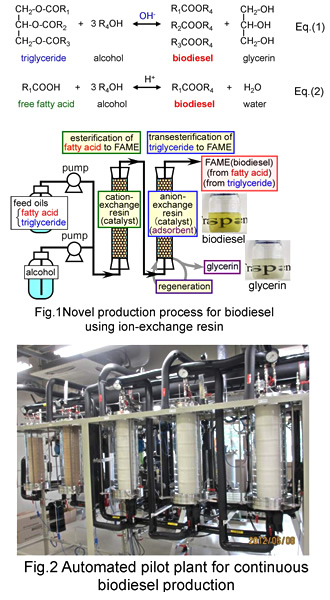Continuous production technology for biodiesel
 Biodiesel (fatty acid ester) has received much attention as a non-toxic, low emission and renewable energy alternative to petroleum fuels. It is commonly produced by the transesterification of triglyceride, Eq(1), the main constituent of vegetable oils, with alcohol. In the industrial production, homogeneous alkali is widely used as the catalyst for the transesterification. The crude oils usually contain free fatty acid (FFA), formed by triglyceride hydrolysis and FFA reacts with the alkali catalyst to form alkali soap. The soap contaminates the produced biodiesel and lowers the product yield by interfering with the phase separation of biodiesel and by-product glycerin. In most cases, the refined edible oils with less than 1 wt% FFA are used as feedstocks to prevent soap formation, which causes an increase in the production cost. On the other hands, trace amounts of glycerin remaining in the biodiesel after the phase separation gives rise to serious problems and damages for diesel engines. The downstream purification to remove the impurities is necessary to meet the strict international standard specifications and causes a further increase in the production cost. Biodiesel (fatty acid ester) has received much attention as a non-toxic, low emission and renewable energy alternative to petroleum fuels. It is commonly produced by the transesterification of triglyceride, Eq(1), the main constituent of vegetable oils, with alcohol. In the industrial production, homogeneous alkali is widely used as the catalyst for the transesterification. The crude oils usually contain free fatty acid (FFA), formed by triglyceride hydrolysis and FFA reacts with the alkali catalyst to form alkali soap. The soap contaminates the produced biodiesel and lowers the product yield by interfering with the phase separation of biodiesel and by-product glycerin. In most cases, the refined edible oils with less than 1 wt% FFA are used as feedstocks to prevent soap formation, which causes an increase in the production cost. On the other hands, trace amounts of glycerin remaining in the biodiesel after the phase separation gives rise to serious problems and damages for diesel engines. The downstream purification to remove the impurities is necessary to meet the strict international standard specifications and causes a further increase in the production cost.
In this research, we propose a new technology to produce high-quality biodiesel from oils with high FFA content, 1-100 wt%, which have never been used as feed stock in the current technology. In the process (Fig.1), an expanded-bed reactor packed with a cation-exchange resin catalyst for esterification of FFA, Eq.(2) and that packed with the anion-exchange resin catalyst for transesterification of triglyceride were connected in series. Both FFA and triglyceride in the oil were completely converted to biodiesel without soap formation. In addition, all by-products, glycerin and water, were adsorbed on the anion-exchange resin and the effluent from the process was free from them. The effluent fully met the international standard specifications without any downstream purification processes except for removing methanol. The glycerin adsorbed on the resin was completely recovered as a transparent methanol solution during regeneration of the resin. We have already completed pilot-scale plant for continuous production (Fig.2).
|



